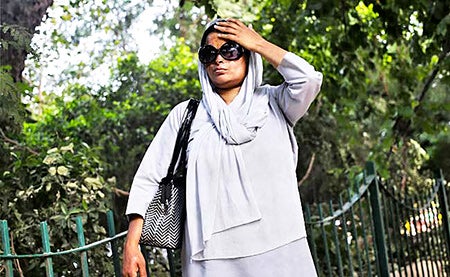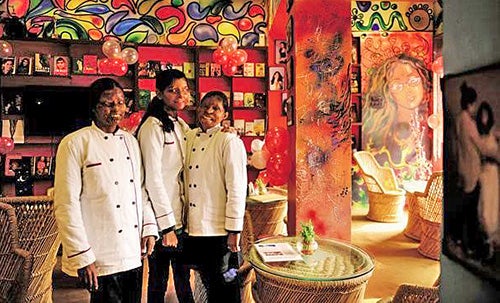Nyamat's Blog
YOU DISSOLVED MY BEAUTY, SLOWLY …SLOWLY: A Study on Acid Attack Survivors
Dated: 21 November 2016

I was initially worried and scared of the unknown: interacting with acid attack survivors. People I had heard of, seen on television and read about but this was something else. Interacting with these heroes, listening to their stories, struggles, accomplishments, dreams and hopes, survivors, made me ask myself one quest what is going on?
I wrote a research paper on the survivors – their struggles, stories, problems and the gap between reality and practice in India with relation to selling and buying of acid bottles- primarily nitric acid. I decided to speak to the vendors who sold these and interviewed them face-to-face. I was astonished to learn that the bottles were being sold freely for a sum of less than USD 30. I interviewed 25 certified pharmacy shop-owners in and around Delhi, both in the rural slums and the up market residential colonies. Thirteen owners asked me how many bottles I wanted and were willing to sell to me. All they asked was “Hard or mild acid?”Five were not aware of any acid ban, while six replied that ‘we buy, we sell as it gets us money and how do we know people will buy it to hurt others.’ Only five shop-owners refused to sell the acid saying that it was illegal. One of the owners replied “Ma’amCheaper than Cola!”
Often labeled as a gender crime: but babies, aged people, animals and men are not spared either. The Delhi Commission of Women (as on 6 August 2015) has promised to provide free treatment to acid attack survivors in private hospitals, the best legal prosecutors to fight their cases, and jobs as per their qualifications, while the government will monitor prevention of this crime. Sale of acid to minors is prohibited.
The reality was still hazy, so I decided to interview 25 acid attack survivors across India though phone calls and home visits. The survivors were from Mumbai, Hyderabad, Pune, Patna,Jaipur, Kanpur and Ranchi. The average age of most of the survivors when they were attacked was 22 years, with most fighting their cases in court for over seven years. Of the 25, only 18 were educated (basic school education), 12 were married and seven employed. The average number of surgeries they had done was 10: Grafting, eye lid surgery, thigh, face and forehead. They had spent over two weeks in hospitals (mostly private), taking loans to pay their medical and legal bills.

When asked what should be the punishment for the attack replies included:“They should be in jail for this for life! Tit for Tat!” Reena in Delhi; “He should be hung until death!” Anju in Bihar. Reasons for the attacks included: “I couldn’t pay rent!”said Reshma, from Kanpur;“My boss wanted to sleep with me, I said no,” from Sonali in Jharkhand; and “My boyfriend thought I was cheating on him “said Reena from Delhi.
I could only think – how petty are the reasons.
Since most survivors showed signs of depression, loneliness and suicidal thoughts, I asked them how they coped with this trauma. Most said that they enjoyed listening to music, praying, were active on Face book or loved watching movies. Their families were their only support system!
It was surprising to hear that only five of the 25 survivors knew what acid was. They knew it was used to clean toilets and recognized it from its foul smell. The others found out after the attack, when the police/doctors told them. As the survivors narrated their horrific experiences, I was dumbstruck: “My T shirt was burnt and someone saved me by throwing water on my chest and then rushed me to the hospital “explained Reena; “My ear, nose and hair was peeling off in my hand” said Anjou.“He kept spilling acid on my face and chest and everything was peeling off” replied Ashiya from Meerut.“My arms were itching and burning like needles, the acid felt like water first but then my whole body was on fire and he watched me,” said Padma.
Their lives have changed. Many of them now cover their bodies, eyes and wear sunglasses. They have stopped wearing dresses and don’t apply make-up, as their skin is too sensitive. Sapna sums it all up, “I am ugly inside and outside!”A male survivor, Aarif said, “I want to have sex, but no one will touch me. Even my wife has left me.”
THIS WAS THE REALITY!
India needs to become acid attack-free. But this crime will continue, as long as there is an anger towards women for bearing boys as males are preferred , being educated, and having a choice in matters; high rates of domestic violence, the open sale of acid, copycat crimes, a feeling of revenge over the smallest of issues, and most of all, no fear of law. India must also improve its psychosocial support system, provide free counseling for survivors and their families, and education, skills training and job opportunities for survivors; and it must fast-track cases. The media also needs to be sensitive while reporting such cases.

I also feel that the public in India needs basic anger management counseling, especially in schools so people are sensitized at a young age about gender crimes and their repercussion . Moreover, water first-aid and public drills with students to tell them to immerse themselves with water after an attack and all stakeholders like lawyers and doctors to work together with the survivor.In Agra, Uttar Pradesh, the land of the Taj Mahal, there is a café called SHEROES. It is decorated with graffiti art, every corner of the café telling a story. The café is run by five acid attack women survivors. A ‘Pay as you wish’ policy operates, in which customers can leave whatever they want, in the knowledge that the money will eventually go to providing medical and legal aid for survivors.
Nyamat Bindra took a lead in writing a research paper on Organ Donation in India for Consumers India and it won her team the title: ‘TOP 3 Well-Researched Paper Award in 2014’.As an independent consultant with Make Love not Scars , she wrote a paper on Acid attack survivors in India and presented it in the 9th EGEP at EWHA Women’s University in Korea in 2016. She is currently editing, translating and working on case studies and research for a comic book, Spreadingthewings, on menstrual health and hygiene for young girls, which will be published in 2017.
To know more on her, visit her BLOG – Make love not scars website